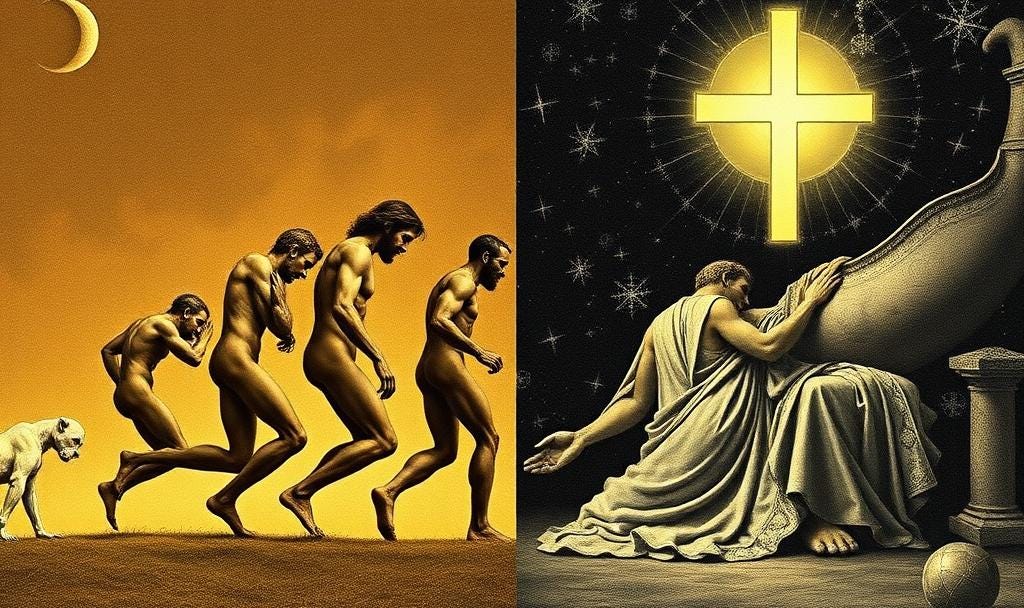The ongoing debate between creationism and evolution has sparked countless discussions over the years, often highlighting their differences. However, what is often overlooked is that both perspectives surprisingly converge on one critical point—man came after creation. Despite their contrasting explanations, both theories acknowledge that the existence of mankind followed the formation of the universe and the world.
I believe this is a good point to think about if you are debating creation from a Biblical perspective. Remember that both theories agree that something had to create the universe (it did just not exist) so if that is the case then it comes down to what you choose to believe (That a Big Bang created the intricate universe or that God created the universe)
Creationism: The Biblical Account
Creationism is rooted in the belief that God is the divine creator of the universe and all life forms. The Bible, particularly in the book of Genesis, outlines a clear sequence of creation where man appears as the final masterpiece of God's work.
1. The Order of Creation (Genesis 1:1-31)
The first chapter of Genesis provides a chronological breakdown of creation. The heavens and the earth were created first, followed by light, land, seas, vegetation, celestial bodies, animals, and finally, man. The following verses emphasize this order:
Genesis 1:1 – "In the beginning, God created the heavens and the earth."
Genesis 1:11 – "Then God said, 'Let the earth bring forth grass, the herb that yields seed, and the fruit tree that yields fruit.'"
Genesis 1:26-27 – "Then God said, 'Let Us make man in Our image, according to Our likeness.'... So God created man in His own image."
From these verses, it is evident that man was created on the sixth day, making humanity the final act in the creation process.
2. Man's Dominion Over Creation (Genesis 1:28)
Another critical point is that God gave man dominion over all other creatures, indicating that they were already present before mankind.
"Then God blessed them, and God said to them, 'Be fruitful and multiply; fill the earth and subdue it; have dominion over the fish of the sea, over the birds of the air, and over every living thing that moves on the earth.'"
This verse confirms that the creation of animals and plants preceded the creation of man, placing humanity in a position of authority over the natural world.
Evolution: Scientific Perspective
Evolutionary theory, proposed by Charles Darwin and supported by modern science, suggests that life developed through gradual changes over millions of years. While evolution does not align with the instantaneous creation described in the Bible, it still supports the concept that human beings came into existence long after the formation of the earth.
1. The Formation of the Universe
Scientific theories like the Big Bang suggest that the universe came into existence approximately 13.8 billion years ago, with Earth forming about 4.5 billion years ago. Life, starting from simple organisms, emerged much later.
2. The Progression of Life Forms
Evolution outlines a gradual process where simple life forms evolved into more complex organisms. Fossil records show that plants, fish, reptiles, and mammals appeared long before the first Homo sapiens (humans), who are estimated to have emerged around 300,000 years ago.
3. Man as the Latest Species
Scientific evidence suggests that humans are the most recent addition to the chain of life, aligning with the biblical idea that mankind came after the rest of creation.
Common Ground: Man Came Last
While creationism and evolution differ fundamentally in their methods and timelines, they both agree on one profound truth—man came after the formation of the universe and other forms of life. This shared understanding bridges the gap between faith and science, offering a unique perspective that both worldviews can appreciate.
Conclusion
The intersection between creationism and evolution highlights that despite their differences, they both acknowledge that humanity arrived as the final piece in the grand tapestry of existence. Whether through divine intervention or natural processes, the agreement that man followed creation invites deeper conversations about the origins of life.
If you are on the fence about the Biblical account of Creation this is something to keep in the back of your mind.
It is interesting that Evolution notes there had to be a creator. Looking at creation it is hard to believe that a “Big Bang” was responsible for everything we see on Earth and everything we don’t see in the cosmos.
Explore the Bible Academy. Video courses, private members dashboard, workbooks, articles, and hours of hands on video training… Become a Donating member to help support the ministry.





It is interesting that there is points of agreement between creationism and evolution. And this would be a good conversation starter we can have with someone who is a believer of evolution.